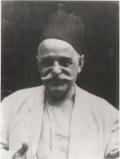 Gurdjieff was born in Armenia around 1870. Although his first tutor was a priest, he received a scientific education, but in surroundings and a way of life that had changed little for centuries. To his questions: Who am I? Why am I here? he found no answer either in religion or in science, but suspected that the truth lay hidden behind what had come down from the past in religious traditions and those strange myths and legends which he learned from his father, a traditional bard or ‘ashokh’. Inspiring like-minded companions, he set out to find in Asia and Africa the truth he sought, learning many languages, and acquiring many practical skills to earn the money for his journeys.
Gurdjieff was born in Armenia around 1870. Although his first tutor was a priest, he received a scientific education, but in surroundings and a way of life that had changed little for centuries. To his questions: Who am I? Why am I here? he found no answer either in religion or in science, but suspected that the truth lay hidden behind what had come down from the past in religious traditions and those strange myths and legends which he learned from his father, a traditional bard or ‘ashokh’. Inspiring like-minded companions, he set out to find in Asia and Africa the truth he sought, learning many languages, and acquiring many practical skills to earn the money for his journeys.
In 1912 he brought to Moscow an unknown teaching, a teaching that was not a religion, nor a philosophy, but a practical teaching to be lived. To follow the way he proposed, nothing is to be believed until verified by direct experience and life in the world is not to be renounced. It is a way in life, on which – gradually, for it cannot be done all at once – everything has to be questioned – one’s beliefs, assumptions, attitudes, one’s whole outlook on the life of man on this Earth.
Man is asleep, said Gurdjieff, he has no real consciousness or will. He is not free; to him, everything happens. He can become conscious and find his true place as a human being in the creation, but this requires a profound transformation.
Gurdjieff calls us to awaken, telling us:
“Man’s possibilities are very great. You cannot even conceive a shadow of what man is capable of attaining. But nothing can be attained in sleep. In the consciousness of a sleeping man his illusions, his ‘dreams’ are mixed with reality. He lives in a subjective world and he can never escape from it. And this is the reason why he can never make use of all the powers he possesses and why he lives in only a small part of himself.”
